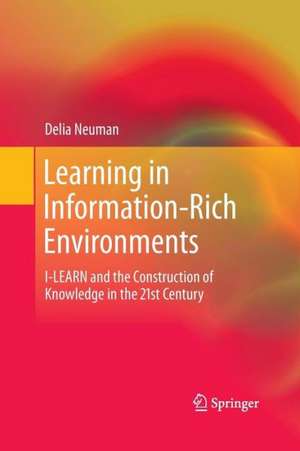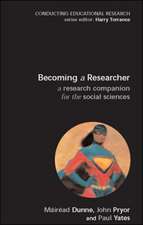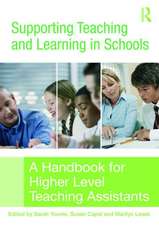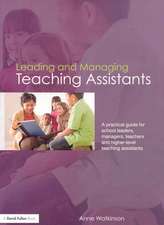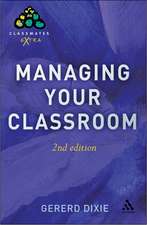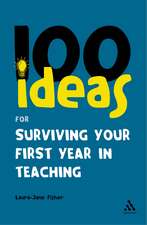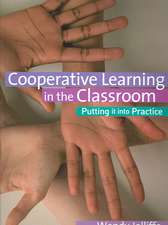Learning in Information-Rich Environments: I-LEARN and the Construction of Knowledge in the 21st Century
Autor Delia Neumanen Limba Engleză Paperback – 23 aug 2014
If the characteristics of “the information age” demand new conceptions of commerce, national security, and publishing—among other things—it is logical to assume that they carry implications for education as well. In fact, a good deal has been written over the last several decades about how education as a whole must transform its structure and curriculum to accommodate the possibilities offered by new technologies. Far less has been written, however, about how the specific affordances of these technologies—and the kinds of information they allow students to access and create—relate to the central purpose of education: learning. What does “learning” mean in an information-rich environment? What are its characteristics? What kinds of tasks should it involve? What concepts, strategies, attitudes, and skills do educators and students need to master if they are to learn effectively and efficiently in such an environment? How can researchers, theorists, and practitioners foster the well-founded and widespread development of such key elements of the learning process?
This book explores these questions and suggests some tentative answers. Drawing from research and theory in three distinct but related fields—learning theory, instructional systems design, and information studies—it presents a way to think about learning that responds directly to the actualities of a world brimming with information. The book is grounded in the work of such key figures in learning theory as Bransford and Anderson & Krathwohl. It draws on such theorists of instructional design as Gagne, Mayer, and Merrill. From information studies, it uses ideas from Buckland, Marchionini, and Wilson (who is known for his pioneering work in “information behavior”—that is, the full range of information seeking and use). The book breaks new ground in bringing together ideas that have run in parallel for years but whose relationship has not been fully explored.
Preț: 720.22 lei
Preț vechi: 878.31 lei
-18% Nou
Puncte Express: 1080
Preț estimativ în valută:
137.83€ • 142.39$ • 114.71£
137.83€ • 142.39$ • 114.71£
Carte tipărită la comandă
Livrare economică 26 martie-09 aprilie
Preluare comenzi: 021 569.72.76
Specificații
ISBN-13: 9781489993588
ISBN-10: 1489993584
Pagini: 160
Ilustrații: XV, 141 p.
Dimensiuni: 155 x 235 x 8 mm
Greutate: 0.23 kg
Ediția:2011
Editura: Springer Us
Colecția Springer
Locul publicării:New York, NY, United States
ISBN-10: 1489993584
Pagini: 160
Ilustrații: XV, 141 p.
Dimensiuni: 155 x 235 x 8 mm
Greutate: 0.23 kg
Ediția:2011
Editura: Springer Us
Colecția Springer
Locul publicării:New York, NY, United States
Public țintă
ResearchCuprins
Information as a Tool for Learning.- Information-Rich Environments, Part One.- Information-Rich Environments, Part Two.- Today’s Learners as Information Users.- I-LEARN: A Model for Knowledge Construction in the Information Age.- Issues in Learning in Information-Rich Environments.- Assessing Learning in Information-Rich Environments.- Conclusion.
Textul de pe ultima copertă
Learning in Information-Rich Environments
I-LEARN and the Construction of Knowledge in the 21st Century
Delia Neuman
Human beings are bombarded with information at all times—not just electronically, but through our senses and experiences, affecting how we seek, process, and create information. From this limitless complexity comes an important question: how can we learn and teach more effectively in our information-generating world?
Grounded in seminal ideas in learning theory, instructional systems design, and information studies, Learning in Information-Rich Environments brings together ideas that have run in parallel for years but whose relationship has not been explored in full until now, expanding on familiar and contemporary concepts of learning to include our interactivity with everyday situations and stimuli. This comprehensive and thought-provoking analysis links traditional theories to emerging ideasin learning by:
Its skillful blend of elegant concepts and real-world evidence makes Learning in Information-Rich Environments a must-read title forgraduate students and educators in educational theory, instructional design, and information science.
I-LEARN and the Construction of Knowledge in the 21st Century
Delia Neuman
Human beings are bombarded with information at all times—not just electronically, but through our senses and experiences, affecting how we seek, process, and create information. From this limitless complexity comes an important question: how can we learn and teach more effectively in our information-generating world?
Grounded in seminal ideas in learning theory, instructional systems design, and information studies, Learning in Information-Rich Environments brings together ideas that have run in parallel for years but whose relationship has not been explored in full until now, expanding on familiar and contemporary concepts of learning to include our interactivity with everyday situations and stimuli. This comprehensive and thought-provoking analysis links traditional theories to emerging ideasin learning by:
- Demonstrating that information is the basic unit of learning, critical thinking, and problem solving.
- Defining information-rich environments and the range of information formats—including print, audio, video, and others—that comprise them.
- Extending these concepts to the Internet/World Wide Web and the current spectrum of information and communication technologies used for learning.
- Exploring the 21st-century skills and strategies needed to capitalize on learning opportunities in contemporary information environments.
- Setting out the non-linear I-LEARN model of gaining and using knowledge in formal and informal information-rich environments.
- Discussing how I-LEARN can be used in the assessment of learning, and in the design of assessment tools.
Its skillful blend of elegant concepts and real-world evidence makes Learning in Information-Rich Environments a must-read title forgraduate students and educators in educational theory, instructional design, and information science.
Caracteristici
Addresses learner needs in this information explosion Provides a comprehensive framework of relevant theories and research Introduces the I-LEARN model
